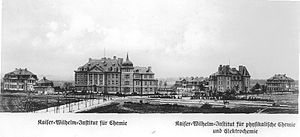Type a search term to find related articles by LIMS subject matter experts gathered from the most trusted and dynamic collaboration tools in the laboratory informatics industry.


Kaiser-Wilhelm-Gesellschaft zur Förderung der Wissenschaften (în română Societatea Kaiser Wilhelm pentru promovarea științelor), sau simplu Kaiser-Wilhelm-Gesellschaft, cu acronim KWG, a fost o organizație științifică fondată în Imperiul German în anul 1911. Ea a funcționat ca umbrelă pentru o serie de unități de cercetare, în principal institute de cercetare fundamentală, care au fost create și finanțate sub autoritatea sa. Această activitate a continuat în anii Republicii de la Weimar și în Germania Nazistă. Societatea Kaiser Wilhelm a fost desființată în anul 1946 prin ordinul oficiului guvernării militare americane din Germania ocupată; funcțiile ei au fost reluate în 1948 de Societatea Max Planck.[1]
| An | Nume | Premiu Nobel | Motivarea Comitetului Nobel |
|---|---|---|---|
| 1914 | Max von Laue | Premiul Nobel pentru Fizică | „for his discovery of the diffraction of X-rays by crystals”
|
| 1915 | Richard Willstätter | Premiul Nobel pentru Chimie | „for his researches on plant pigments, especially chlorophyll” |
| 1918 | Fritz Haber | Premiul Nobel pentru Chimie | „for the synthesis of ammonia from its elements” |
| 1918 | Max Planck | Premiul Nobel pentru Fizică | „in recognition of the services he rendered to the advancement of Physics by his discovery of energy quanta” |
| 1921 | Albert Einstein | Premiul Nobel pentru Fizică | „for his services to Theoretical Physics, and especially for his discovery of the law of the photoelectric effect” |
| 1922 | Otto Meyerhof | Premiul Nobel pentru Fiziologie sau Medicină | „for his discovery of the fixed relationship between the consumption of oxygen and the metabolism of lactic acid in the muscle” |
| 1925 | James Franck | Premiul Nobel pentru Fizică | „for their discovery of the laws governing the impact of an electron upon an atom” |
| 1931 | Carl Bosch | Premiul Nobel pentru Chimie | „in recognition of their contributions to the invention and development of chemical high pressure methods” |
| 1931 | Otto Heinrich Warburg | Premiul Nobel pentru Fiziologie sau Medicină | „for his discovery of the nature and mode of action of the respiratory enzyme” |
| 1932 | Werner Heisenberg | Premiul Nobel pentru Fizică | „for the creation of quantum mechanics, the application of which has, inter alia, led to the discovery of the allotropic forms of hydrogen” |
| 1935 | Hans Spemann | Premiul Nobel pentru Fiziologie sau Medicină | „for his discovery of the organizer effect in embryonic development” |
| 1936 | Peter Debye | Premiul Nobel pentru Chimie | „for his contributions to our knowledge of molecular structure through his investigations on dipole moments and on the diffraction of X-rays and electrons in gases” |
| 1938 | Richard Kuhn | Premiul Nobel pentru Chimie | „for his work on carotenoids and vitamins” |
| 1939 | Adolf Butenandt | Premiul Nobel pentru Chimie | „for his work on sex hormones” |
| 1944 | Otto Hahn | Premiul Nobel pentru Chimie | „for his discovery of the fission of heavy nuclei” |